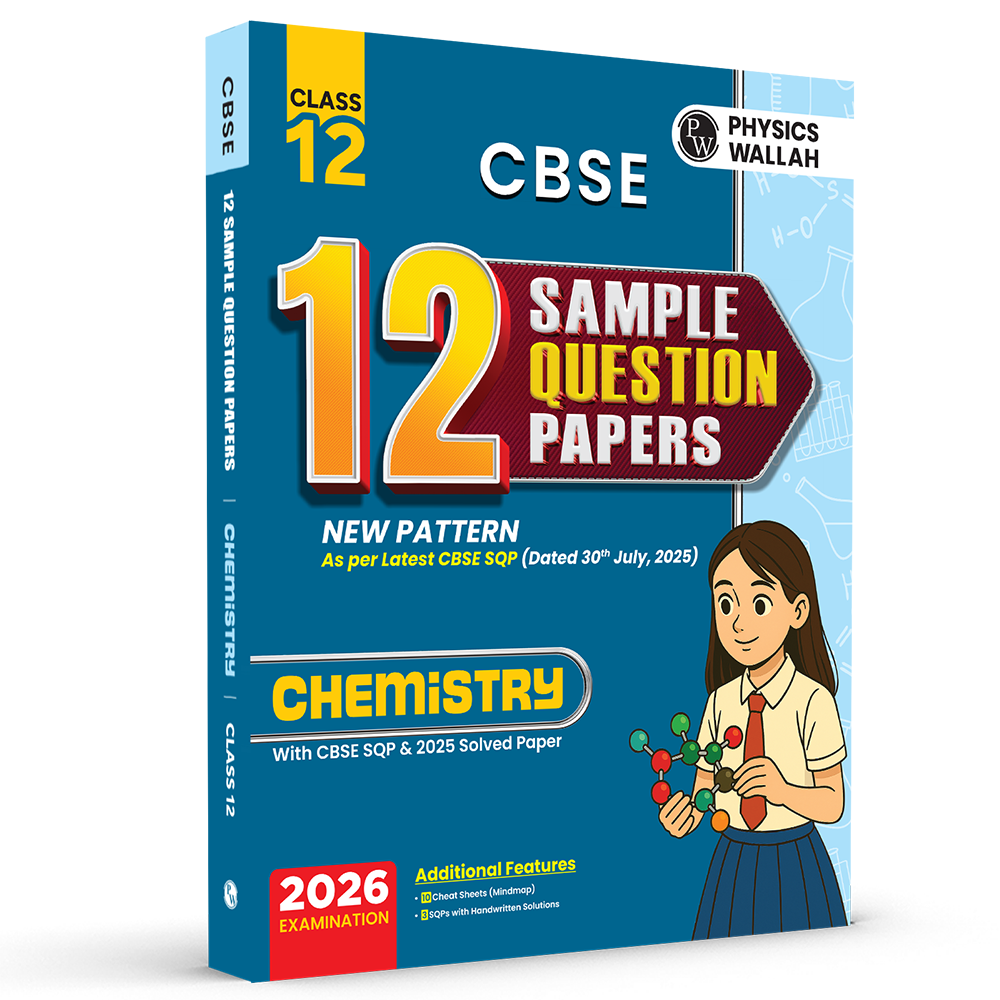Toughest and Easiest Chapters in CBSE Class 12 Chemistry

Toughest and Easiest Chapters in CBSE Class 12 Chemistry: Chemistry is one of the most important subjects in the Class 12 Science stream. Students who are preparing for the Class 12 board exam must check the easiest chapter in Chemistry Class 12 and the toughest chapter in Chemistry Class 12 in this article. Tough chapters in Chemistry Class 12 include topics such as Chemical Kinetics, Thermodynamics, Aldehydes, Ketones and Carboxylic Acids, Biomolecules, Coordination Compounds, etc. Easy chapters in Chemistry Class 12 include topics such as Basic concepts of Chemistry, Hydrogen, p-Block Elements, Solid State, etc. Students must prepare a well-structured preparation plan for these topics for the class 12 board examination.
Check out: CBSE Chemistry Class 12 Sample Paper 2026
Chemistry Chapters Class 12
Students studying in Class 12 can check the topics included in Chemistry Class 12 Chapters in the table below. Chemistry Chapters Class 12 includes units such as Solid State, Electrochemistry, Chemical Kinetics, Surface Chemistry, Coordination Compounds, Amines, etc. Candidates can check Chemistry Class 12 Chapters below.
-
Unit 1: The Solid State
-
Unit 5: Surface Chemistry
-
Unit 6: General Princi[ples and Processes of Isolation of Elements
-
Unit 7: The p-Bock Elements
-
Unit 8: The d and f Block Elements
-
Unit 9: Coordination Compounds
-
Unit 12: Aldehydes, Ketones and Carboxylic Acid
-
Unit 13: Amines
-
Unit 14: Biomolecules
-
Unit 15: Polymers
-
Unit 16: Chemistry in Everyday Life
Check out: CBSE Class 12 Science Stream Sample Papers For 2024-2025 Board Exams
Easiest Chapter in Chemistry Class 12
Students can check easy chapters in Chemistry Class 12 below
Some Basic Concepts of Chemistry
-
What It Involves: This chapter lays the groundwork for stoichiometry, which involves calculating the amounts of reactants and products in chemical reactions.
-
Why It's Easier: The concepts are fundamental and typically involve straightforward calculations, making them accessible for most students.
Hydrogen
-
What It Involves: This chapter discusses the properties of hydrogen and its compounds.
-
Why It's Easier: The properties and behavior of hydrogen are relatively simple, and the reactions it undergoes are easier to memorize.
p-Block Elements
-
What It Involves: This chapter covers elements in groups 13 to 18 of the periodic table, focusing on their properties and compounds.
-
Why It's Easier: While some reactions may be complex, many students find the trends in properties easier to grasp, especially when linked to the periodic table.
Solid State
-
What It Involves: This chapter looks at the structure and properties of solids, including types of crystal lattices.
-
Why It's Easier: The concepts can be visualized easily, and the classification of solids is usually straightforward.
Check out: CBSE Question Bank Class 12 Chemistry
Toughest Chapters in Chemistry Class 12
Along with Class 12 Chemistry easy chapters, students should also know the tough chapters in Chemistry Class 12 below
Chemical Kinetics
-
What It Involves: This chapter focuses on the speed of chemical reactions and the factors that affect this speed.
-
Challenges: Candidates often struggle with concepts like reaction rates, the effect of temperature and concentration on these rates, and complex mathematical equations involved in deriving rate laws.
Thermodynamics
-
What It Involves: This chapter deals with the principles of energy changes during chemical reactions.
-
Challenges: Understanding concepts such as enthalpy (heat content), entropy (disorder), and Gibbs free energy (energy available to do work) can be complex. Candidates need to grasp how these concepts interrelate and apply them to various chemical processes.
Aldehydes, Ketones, and Carboxylic Acids
-
What It Involves: This chapter covers the properties, reactions, and mechanisms of these organic compounds.
-
Challenges: The various reactions (like nucleophilic addition) and their mechanisms can be intricate, requiring thorough memorization and understanding of how these compounds behave chemically.
Biomolecules
-
What It Involves: This chapter discusses the structures and functions of essential biomolecules, such as carbohydrates, proteins, and nucleic acids.
-
Challenges: The complexity of structures and the variety of functions in biological systems make this chapter particularly demanding for many students.
Coordination Compounds
-
What It Involves: This chapter deals with compounds formed by the coordination of metal ions with ligands.
-
Challenges: Understanding coordination numbers, the nature of ligands, and theories like Valence Bond Theory (VBT) and Crystal Field Theory (CFT) can be quite challenging due to the abstract nature of the concepts.
Check out: Class 12th Sample Papers
Class 12 Chemistry Easy Chapters Preparation Tips
Students who are preparing for class 12 Chemistry subject must follow the below preparation tips.
Understand the Syllabus: Students should start by familiarizing themselves with the Class 12 Chemistry syllabus. Knowing the topics they need to study will help them plan their preparation effectively. They should focus on core areas such as Physical Chemistry, Organic Chemistry, and Inorganic Chemistry.
Create a Study Schedule: Students should make a daily or weekly timetable that includes time for Chemistry along with other subjects. This helps in organizing study time and ensures that all topics are covered. Sticking to the schedule as much as possible is important.
Focus on Concepts: Chemistry is all about understanding concepts. Students should not just memorize facts; they need to understand why things happen the way they do. For example, in Thermodynamics, grasping the reasons behind energy changes in reactions is crucial.
Use NCERT Textbooks: NCERT textbooks are essential for Class 12 Chemistry. They cover the syllabus well and are written in a clear manner. Students should read each chapter thoroughly, paying attention to definitions, important concepts, and examples.
Take Notes: While studying, students should make their own notes. Writing down key points, formulas, and reactions helps with later revision. Summarizing complex topics in their own words makes it easier to remember.
Practice Numerical Problems: Subjects like Physical Chemistry often involve numerical problems. Regular practice helps students understand concepts better. They should focus on topics like stoichiometry, chemical kinetics, and thermodynamics.
Study Reaction Mechanisms: In Organic Chemistry, understanding reaction mechanisms is crucial. Instead of memorizing reactions, students should focus on how and why they occur. This approach helps in applying knowledge to different problems.
Use Visual Aids: Diagrams and flowcharts can make complex concepts easier to understand. For example, drawing structures for organic compounds or visualizing reaction pathways helps reinforce learning.
Solve Previous Year Papers: Practicing previous years' question papers is extremely helpful. It gives students an idea of the types of questions commonly asked and helps them manage their time during the exam. Analyzing their performance can identify weak areas.
Take Mock Tests: Mock tests simulate the exam environment. Taking them regularly helps improve speed and accuracy. After each test, students should review their mistakes to understand where they went wrong.
Join Study Groups: Studying with friends or classmates can make learning more enjoyable. Group discussions can clarify doubts and expose students to different perspectives on the same topic.
Stay Healthy: A healthy body contributes to a sharp mind. Students should eat nutritious meals, exercise regularly, and get enough sleep. Staying hydrated is also important for maintaining focus while studying.
Revise Regularly: Setting aside time for regular revision is essential. Students should go over their notes and important concepts frequently to reinforce what they’ve learned.
Ask for Help When Needed: If students find certain topics difficult, they should not hesitate to ask for help. Teachers, friends, or online resources can provide the support needed to understand challenging concepts.
Stay Positive and Motivated: A positive attitude can make a big difference in preparation. Celebrating small achievements along the way helps keep motivation high. Reminding themselves of their goals is important for staying focused.
Check out: Class 12th Question Banks
Class 12 Chemistry Chapters FAQs
Q1. What are some of the toughest chapters in Class 12 Chemistry?
Ans. Some of the toughest chapters include Chemical Kinetics, Thermodynamics, Aldehydes, Ketones and Carboxylic Acids, Biomolecules, and Coordination Compounds.
Q2. What are the easiest chapters in Class 12 Chemistry?
Ans. Some of the easier chapters include Some Basic Concepts of Chemistry, Hydrogen, p-Block Elements, and the Solid State.
Q3. Why is Some Basic Concepts of Chemistry considered easy?
Ans. It focuses on foundational topics like stoichiometry, which involves straightforward calculations that most students find manageable.
Q4. How can previous year question papers help with difficult chapters?
Ans. Solving past papers helps students identify common questions and understand the exam format, which can be particularly useful for tough chapters.










